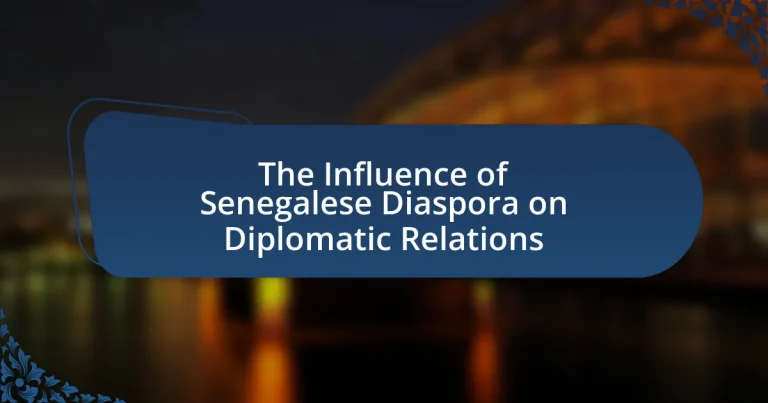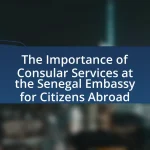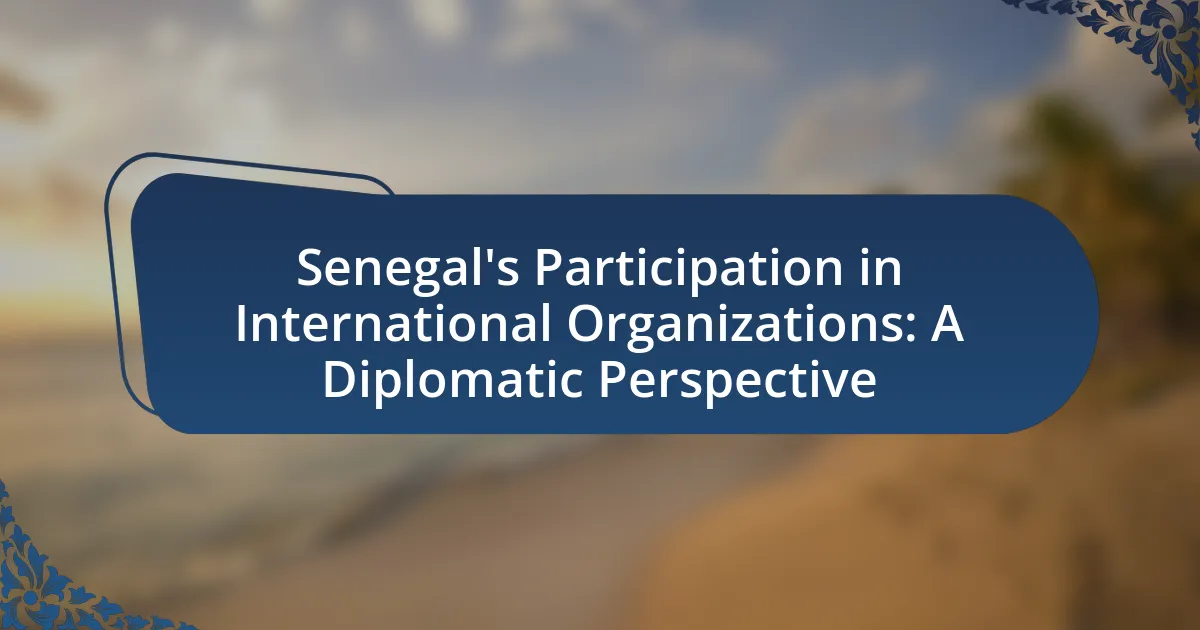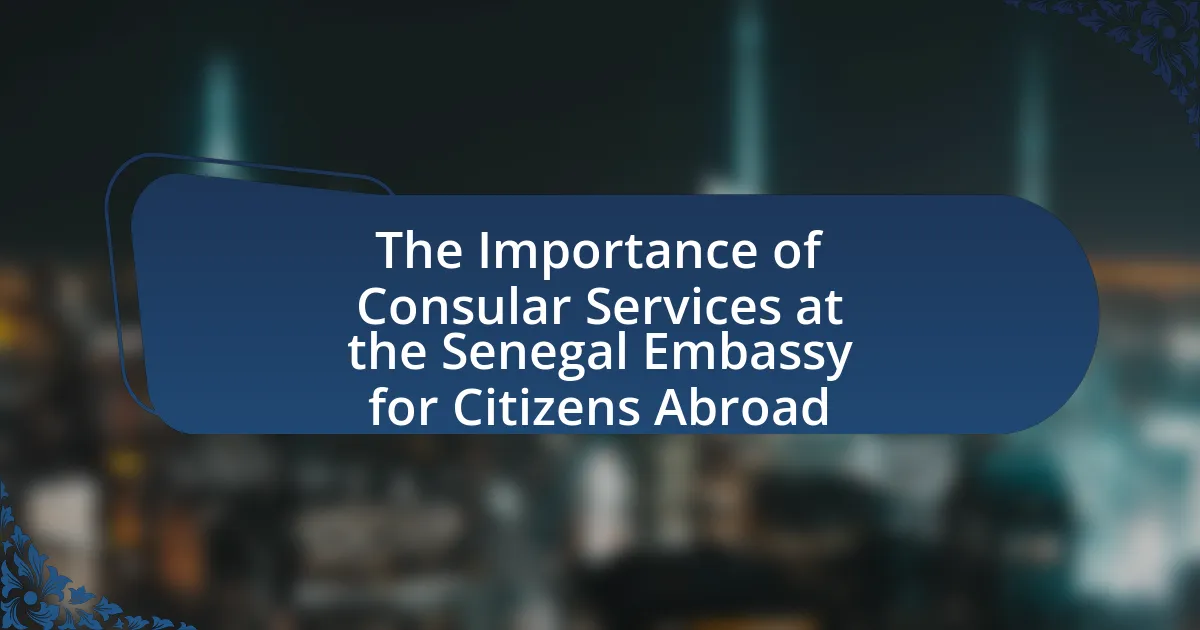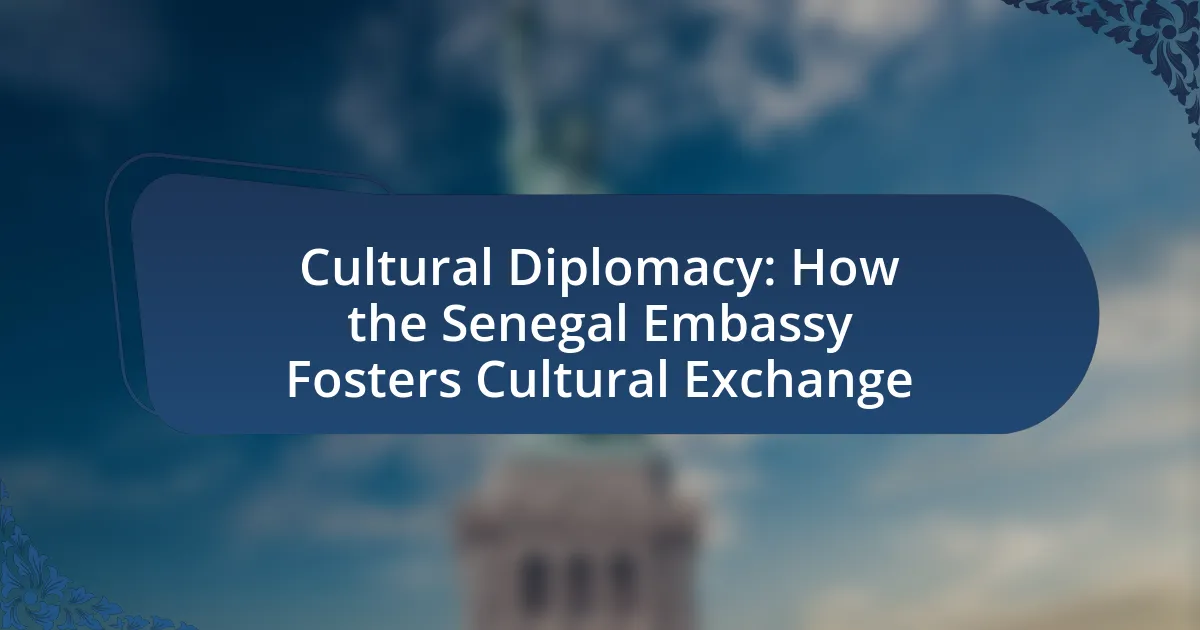The Senegalese diaspora, comprising over 3 million individuals globally, plays a pivotal role in shaping diplomatic relations between Senegal and host countries. This article examines how the diaspora fosters bilateral cooperation through cultural exchange, economic investment, and advocacy, significantly contributing to Senegal’s GDP via remittances. It explores the historical contexts of Senegalese migration, the impact of cultural ties on diplomatic interactions, and the challenges faced by the diaspora in engaging with foreign governments. Additionally, the article highlights the future prospects for the diaspora in enhancing Senegal’s diplomatic presence and the strategies that can be employed to strengthen these ties.
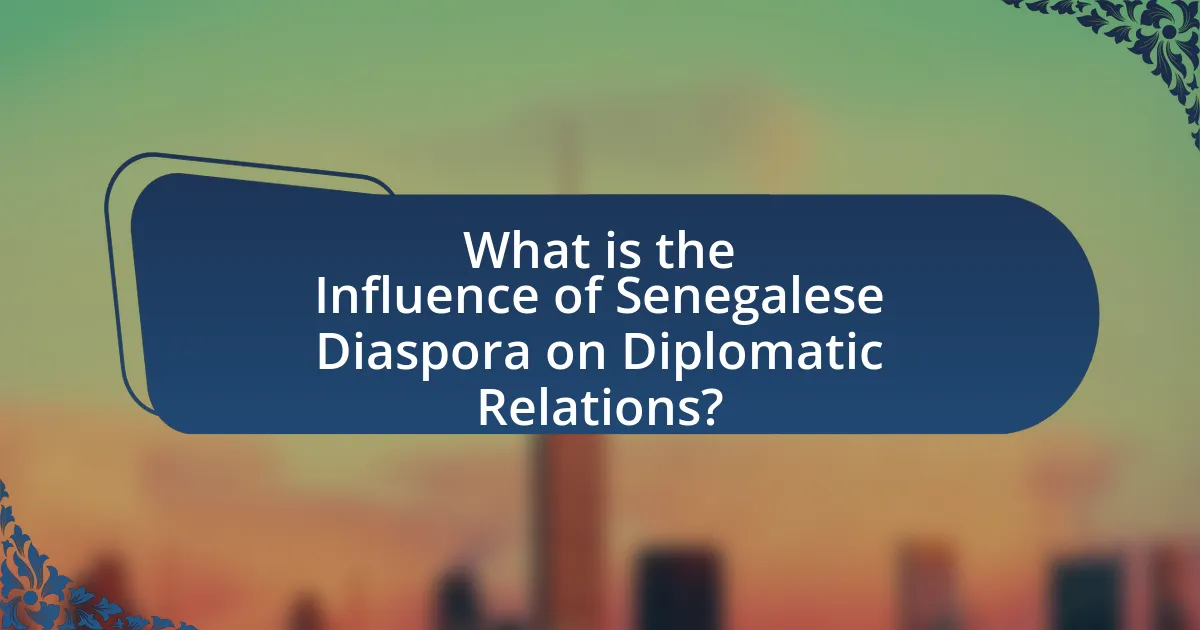
What is the Influence of Senegalese Diaspora on Diplomatic Relations?
The Senegalese diaspora significantly influences diplomatic relations by fostering connections between Senegal and host countries, enhancing bilateral cooperation. This diaspora, estimated at over 3 million people globally, plays a crucial role in promoting Senegal’s cultural identity and economic interests abroad. For instance, remittances from the diaspora contribute approximately 10% to Senegal’s GDP, strengthening economic ties and encouraging foreign investment. Additionally, diaspora members often serve as informal ambassadors, advocating for Senegalese interests and facilitating dialogue on issues such as trade, education, and security. Their involvement in international organizations and networks further amplifies Senegal’s voice on global platforms, thereby enhancing its diplomatic standing.
How does the Senegalese diaspora contribute to diplomatic relations?
The Senegalese diaspora contributes to diplomatic relations by fostering connections between Senegal and host countries through cultural exchange, economic investment, and advocacy. Members of the diaspora often serve as informal ambassadors, promoting Senegal’s interests abroad and enhancing bilateral ties. For instance, remittances sent back to Senegal from the diaspora significantly bolster the national economy, with estimates indicating that these remittances accounted for over 10% of Senegal’s GDP in recent years. Additionally, diaspora organizations actively engage in dialogue with foreign governments, influencing policies that benefit both Senegal and its expatriates. This engagement not only strengthens diplomatic relations but also facilitates collaboration on issues such as trade, education, and security.
What are the historical contexts of Senegalese migration?
The historical contexts of Senegalese migration include colonial influences, economic factors, and social networks. During the colonial period, Senegal was a French colony, which facilitated migration to France for labor opportunities. Post-independence in 1960, economic challenges, including unemployment and limited resources, prompted many Senegalese to seek better prospects abroad. Additionally, established diaspora communities in countries like France and the United States created social networks that encouraged further migration. These historical contexts have shaped the patterns and motivations behind Senegalese migration, influencing the dynamics of the Senegalese diaspora and its impact on diplomatic relations.
How do cultural ties influence diplomatic interactions?
Cultural ties significantly influence diplomatic interactions by fostering mutual understanding and trust between nations. For instance, shared cultural heritage and language can facilitate communication and collaboration, making negotiations smoother. The Senegalese diaspora exemplifies this, as their connections to Senegal enhance bilateral relations with host countries, promoting cultural exchange and economic partnerships. Research indicates that countries with strong cultural ties often experience more favorable diplomatic outcomes, as seen in Senegal’s relationships with France and the United States, where cultural diplomacy has led to increased cooperation in various sectors.
Why is the Senegalese diaspora significant in global diplomacy?
The Senegalese diaspora is significant in global diplomacy due to its extensive network and influence in various countries, which facilitates bilateral relations and cultural exchange. This diaspora, estimated at over 3 million people, plays a crucial role in promoting Senegal’s interests abroad, enhancing trade partnerships, and fostering political dialogue. For instance, Senegalese expatriates often engage in advocacy and lobbying efforts that align with Senegal’s foreign policy objectives, thereby strengthening the country’s diplomatic presence. Additionally, the diaspora contributes to remittances, which accounted for approximately 10% of Senegal’s GDP in 2020, further solidifying economic ties and diplomatic leverage with host nations.
What roles do diaspora communities play in advocacy?
Diaspora communities play crucial roles in advocacy by serving as bridges between their host countries and their countries of origin. They mobilize resources, raise awareness, and influence policy decisions that affect their homeland. For instance, the Senegalese diaspora actively engages in lobbying efforts to promote Senegal’s interests abroad, often collaborating with local organizations and governments to address issues such as human rights, economic development, and cultural preservation. This engagement is evidenced by the establishment of various diaspora-led organizations that focus on advocacy, such as the Senegalese Association for the Promotion of Development, which works to enhance Senegal’s diplomatic relations through community outreach and policy advocacy.
How does the diaspora impact bilateral relations with Senegal?
The Senegalese diaspora significantly enhances bilateral relations by fostering economic ties and cultural exchange. Remittances from the diaspora contribute to Senegal’s economy, with estimates indicating that they account for over 10% of the country’s GDP, thereby strengthening financial connections with host countries. Additionally, the diaspora often acts as informal ambassadors, promoting Senegalese culture and interests abroad, which can lead to increased diplomatic engagement and cooperation. This dynamic is evident in partnerships formed between Senegal and countries with substantial Senegalese communities, facilitating trade agreements and collaborative projects that benefit both parties.
What challenges does the Senegalese diaspora face in diplomatic engagement?
The Senegalese diaspora faces significant challenges in diplomatic engagement, primarily due to limited representation and recognition in host countries. Many Senegalese expatriates encounter bureaucratic hurdles that hinder their ability to participate in diplomatic processes, as they often lack formal channels to voice their concerns or influence policy. Additionally, cultural and linguistic barriers can impede effective communication with local governments, reducing their capacity to advocate for their interests. Research indicates that these obstacles are compounded by a lack of cohesive organization within the diaspora, which diminishes their collective bargaining power in diplomatic matters.
What barriers exist for diaspora participation in diplomacy?
Barriers to diaspora participation in diplomacy include lack of access to decision-making processes, limited recognition of their contributions, and legal restrictions on their involvement. These obstacles hinder the ability of the Senegalese diaspora to engage effectively in diplomatic initiatives. For instance, many countries do not have formal mechanisms for diaspora engagement in foreign policy, which limits their influence. Additionally, the perception that diaspora members lack the necessary expertise or legitimacy can further marginalize their voices in diplomatic discussions.
How do political climates affect diaspora influence?
Political climates significantly affect diaspora influence by shaping their engagement and advocacy efforts. For instance, in times of political stability, diasporas often have greater opportunities to participate in diplomatic dialogues and influence policy decisions in their home countries. Conversely, during periods of political unrest or authoritarian governance, diaspora communities may face restrictions on their ability to mobilize or communicate effectively, which can diminish their impact. Historical examples include the Senegalese diaspora’s role in advocating for democratic reforms during the 2012 presidential elections, where a favorable political climate allowed for increased activism and support for opposition candidates. This illustrates how the political environment directly influences the capacity and effectiveness of diaspora communities in shaping diplomatic relations.
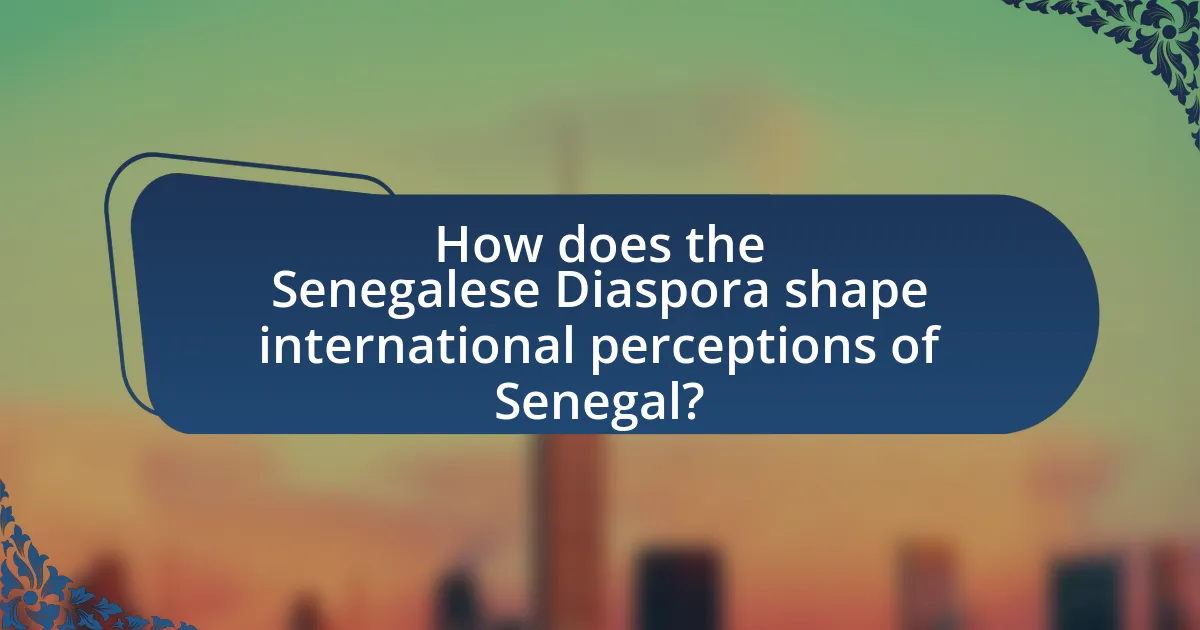
How does the Senegalese Diaspora shape international perceptions of Senegal?
The Senegalese Diaspora significantly shapes international perceptions of Senegal by promoting cultural exchange and economic ties. This diaspora, which includes millions of Senegalese living abroad, actively engages in advocacy and representation, influencing how Senegal is viewed globally. For instance, the diaspora contributes to the economy through remittances, which accounted for approximately 10% of Senegal’s GDP in 2020, thereby enhancing the country’s economic stability and attractiveness to foreign investors. Additionally, cultural events and festivals organized by the diaspora showcase Senegalese traditions, arts, and cuisine, fostering a positive image of the nation. This cultural diplomacy not only strengthens Senegal’s global presence but also encourages international partnerships and collaborations, further shaping perceptions in favor of Senegal.
What narratives are promoted by the Senegalese diaspora?
The Senegalese diaspora promotes narratives of cultural pride, economic development, and social justice. These narratives emphasize the importance of maintaining Senegalese cultural identity abroad while advocating for investment and development in Senegal. For instance, the diaspora often engages in initiatives that support education and entrepreneurship in Senegal, highlighting the potential for economic growth through remittances and business ventures. Additionally, the diaspora raises awareness about social issues, such as migration rights and human rights, thereby influencing diplomatic discussions between Senegal and host countries. These narratives are supported by various organizations and community groups that work to strengthen ties between Senegal and its diaspora, showcasing the impact of their collective efforts on both local and international levels.
How do diaspora-led initiatives enhance Senegal’s image abroad?
Diaspora-led initiatives enhance Senegal’s image abroad by promoting cultural exchange and economic development. These initiatives often involve Senegalese expatriates organizing events that showcase Senegalese art, music, and cuisine, which fosters a positive perception of the country. For instance, the annual Dakar Biennale, supported by the diaspora, attracts international attention and highlights Senegal’s vibrant cultural scene. Additionally, diaspora members invest in local businesses and contribute to development projects, which not only boosts the economy but also demonstrates the potential of Senegal as a destination for investment and tourism. This active engagement helps to build a favorable narrative around Senegal, reinforcing its reputation as a dynamic and culturally rich nation on the global stage.
What role does social media play in shaping perceptions?
Social media significantly shapes perceptions by providing a platform for the dissemination of information and opinions, influencing how individuals and communities view various issues. It allows users to share personal experiences and narratives, which can alter public opinion and create a collective understanding of events. For instance, studies have shown that social media can amplify voices from marginalized communities, leading to increased awareness and empathy regarding their situations. Additionally, research indicates that social media campaigns can sway political opinions and mobilize support for causes, as seen in movements like the Arab Spring, where platforms like Twitter and Facebook played crucial roles in organizing protests and spreading information rapidly.
How does the diaspora engage with foreign governments?
The diaspora engages with foreign governments primarily through advocacy, lobbying, and participation in diplomatic dialogues. Senegalese diaspora communities often form organizations that represent their interests and concerns, which enables them to influence foreign policy decisions that affect Senegal. For instance, these organizations may lobby for favorable immigration policies or trade agreements, thereby directly impacting diplomatic relations between Senegal and host countries. Additionally, the diaspora frequently participates in cultural exchanges and bilateral discussions, fostering mutual understanding and cooperation. This engagement is evidenced by the establishment of platforms such as the Senegalese Diaspora Council, which actively collaborates with the Senegalese government to address issues pertinent to both the diaspora and the homeland.
What strategies do diaspora members use to influence policy?
Diaspora members influence policy through advocacy, lobbying, and mobilizing resources. They engage in advocacy by raising awareness about issues affecting their home country, often utilizing social media platforms to amplify their voices and connect with policymakers. Lobbying efforts include direct engagement with government officials and participation in policy discussions, where they present research and data to support their positions. Additionally, diaspora communities mobilize financial resources to support initiatives that align with their policy goals, such as funding educational programs or development projects in Senegal. These strategies have been effective in shaping diplomatic relations, as evidenced by the Senegalese government’s recognition of the diaspora’s role in national development and policy formulation.
How do partnerships between diaspora and local governments function?
Partnerships between diaspora and local governments function through collaborative initiatives that leverage the skills, resources, and networks of diaspora communities to support local development goals. These partnerships often involve the diaspora providing financial investments, knowledge transfer, and cultural exchange, which can enhance local governance and economic growth. For instance, the Senegalese diaspora has been instrumental in funding infrastructure projects and promoting entrepreneurship in Senegal, thereby strengthening ties between the diaspora and local authorities. Such collaborations are often formalized through agreements that outline mutual benefits, ensuring that both parties work towards shared objectives, ultimately fostering diplomatic relations and community development.
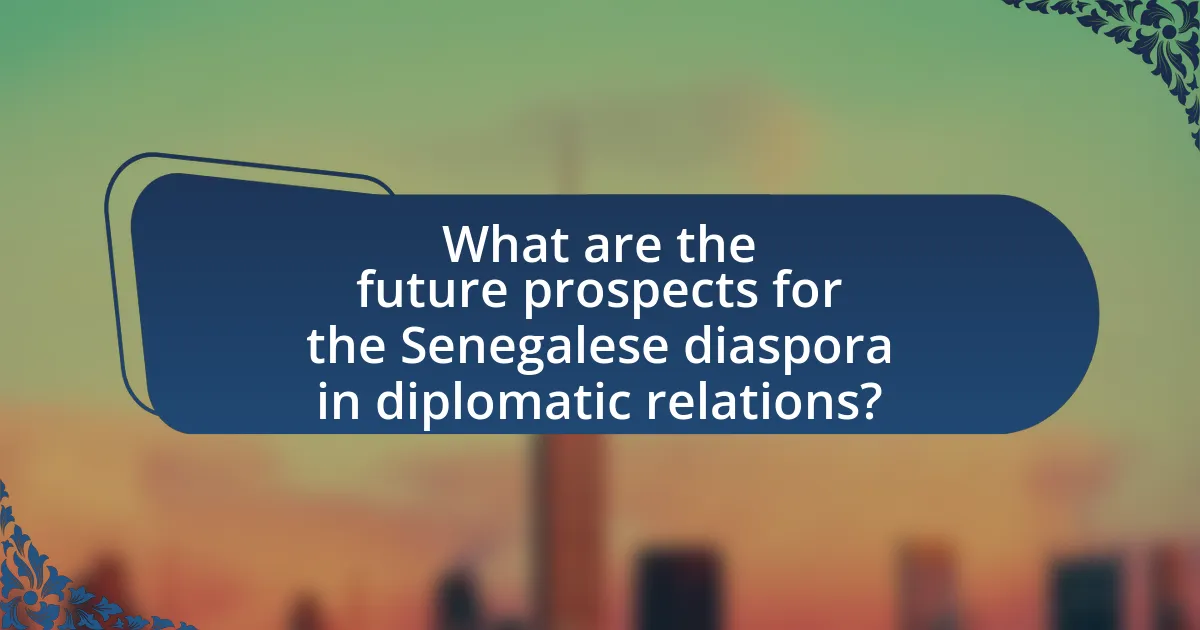
What are the future prospects for the Senegalese diaspora in diplomatic relations?
The future prospects for the Senegalese diaspora in diplomatic relations are promising, as their increasing political engagement and economic contributions enhance Senegal’s global standing. The diaspora, estimated at over 3 million people, plays a crucial role in fostering bilateral ties through remittances, which accounted for approximately 10% of Senegal’s GDP in 2021, and by participating in international organizations. Their involvement in advocacy and policy-making can further strengthen diplomatic relations, particularly with countries where they reside, such as France and the United States, which have historical ties with Senegal. This engagement is supported by initiatives like the Senegalese government’s Diaspora Policy, aimed at integrating diaspora contributions into national development strategies.
How can the Senegalese diaspora enhance its diplomatic role moving forward?
The Senegalese diaspora can enhance its diplomatic role moving forward by actively engaging in advocacy and policy-making that aligns with Senegal’s national interests. By leveraging their global networks, diaspora members can influence foreign policy decisions and promote Senegal’s cultural and economic interests abroad. For instance, the Senegalese diaspora in the United States has successfully lobbied for increased bilateral trade agreements, which can be evidenced by the African Growth and Opportunity Act (AGOA) that benefits Senegalese exports. Additionally, establishing formal channels of communication between the diaspora and the Senegalese government can facilitate collaboration on issues such as investment, education, and technology transfer, further strengthening diplomatic ties.
What opportunities exist for collaboration with Senegalese authorities?
Collaboration opportunities with Senegalese authorities include partnerships in economic development, cultural exchange, and technology transfer. The Senegalese government actively seeks foreign investment and expertise to enhance its infrastructure and boost sectors such as agriculture, renewable energy, and information technology. For instance, the Senegal Emerging Plan aims to attract international partners to support its development goals, which presents a clear avenue for collaboration. Additionally, the Senegalese diaspora plays a crucial role in fostering these partnerships by leveraging their networks and resources to facilitate dialogue and investment opportunities between Senegal and other countries.
How can technology facilitate diaspora engagement in diplomacy?
Technology can facilitate diaspora engagement in diplomacy by providing platforms for communication, collaboration, and information sharing. Digital tools such as social media, video conferencing, and dedicated diaspora engagement platforms enable Senegalese expatriates to connect with their home country’s diplomatic missions, share their perspectives, and participate in policy discussions. For instance, the use of social media allows for real-time dialogue between diplomats and diaspora communities, fostering a sense of inclusion and representation. Additionally, online forums and webinars can be utilized to educate the diaspora about diplomatic initiatives and encourage their involvement in advocacy efforts, thereby strengthening the ties between the Senegalese government and its citizens abroad.
What best practices can be adopted for effective diaspora diplomacy?
Effective diaspora diplomacy can be enhanced by adopting practices such as fostering strong communication channels, engaging diaspora communities in policy-making, and leveraging their expertise and resources. Strong communication channels ensure that the diaspora is informed about national issues and can provide feedback, which is crucial for building trust and collaboration. Engaging diaspora communities in policy-making allows for their unique perspectives and experiences to shape diplomatic strategies, making them more relevant and effective. Additionally, leveraging the expertise and resources of the diaspora can facilitate economic investments and cultural exchanges, which strengthen diplomatic ties. For instance, the Senegalese government has successfully utilized its diaspora to promote investment in local businesses, demonstrating the tangible benefits of these best practices in enhancing diplomatic relations.
What lessons can be learned from other diasporas in diplomatic roles?
Lessons from other diasporas in diplomatic roles include the importance of leveraging cultural connections and networks to enhance diplomatic engagement. For instance, the Indian diaspora has successfully utilized its extensive global network to foster economic ties and promote cultural diplomacy, which has strengthened India’s international relations. Additionally, the Jewish diaspora has demonstrated the effectiveness of organized advocacy and lobbying efforts, influencing foreign policy in favor of Israel. These examples highlight that diasporas can serve as vital intermediaries, facilitating dialogue and cooperation between their host and home countries, ultimately enhancing diplomatic relations.
How can the Senegalese diaspora build sustainable networks for influence?
The Senegalese diaspora can build sustainable networks for influence by leveraging technology and social media platforms to connect and collaborate on shared goals. These digital tools facilitate communication and organization, enabling diaspora members to share resources, knowledge, and experiences that can amplify their collective voice. For instance, organizations like the Senegalese Diaspora Network have successfully utilized online platforms to mobilize support for initiatives that impact both Senegal and their host countries. Additionally, establishing partnerships with local NGOs and government entities can enhance their influence, as evidenced by the collaboration between Senegalese diaspora groups and local organizations in advocating for policy changes.
